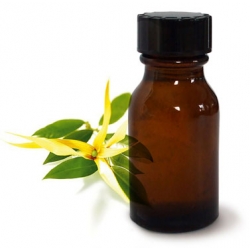Ylang Ylang Oil (Cananga Odorata Oil) is an extremely fragrant essential oil that comes from the fragrant flowers of the tree Cananga odorata. It is colorless to pale yellow and it has a rich, exotic and sweet floral aroma.
The name ylang-ylang is derived from Tagalog, either from the word ilang, meaning “wilderness”, alluding to its natural habitat, or the word ilang-ilan, meaning “rare”, suggestive of its exceptionally delicate scent. A common mistranslation is “flower of flowers”
Contents
Uses
- It has a calming effect on the mind and body and is often used by aromatherapists to treat stress and depression.
Benefits
- Ylang-ylang oil has a euphoric and sedative effect on the nervous system and helps to relieve feelings of anxiety, tension, shock, fear and panic.
- Believed to reduce high blood pressure and relieve intestinal infections by inhibiting the growth of harmful microorganisms.
- Considered to be an aphrodisiac with qualities that can help ease symptoms of impotence and frigidity.
- Helps maintain healthy skin by keeping the skin hydrated and smooth. It has a soothing effect and can help control overly-dry as well as overly-oily skin by balancing out and normalizing the secretion of sebum.
- It also has a stimulating effect on the scalp which helps to promote hair growth.
Cautions
- Ylang-Ylang Oil is often falsified with cocoa butter or coconut oil. To test, leave a sample in the freezer for a short while; if it has thickened and become cloudy, it is sure to have been adulterated. Sometimes the oil sold as ylang-ylang at a very inflated price is cananga.
- Unfortunately, because of the demand for ylang-ylang oil from the perfumery industry, particularly that of France, the distillers often ignore the use of the oil in therapy; if the oil is not of the very best quality, the therapeutic properties are of little value.
- Ylang-ylang Essential Oil can cause sensitivity on some people and excessive use of it may lead to headaches and nausea. Avoid while pregnant.

